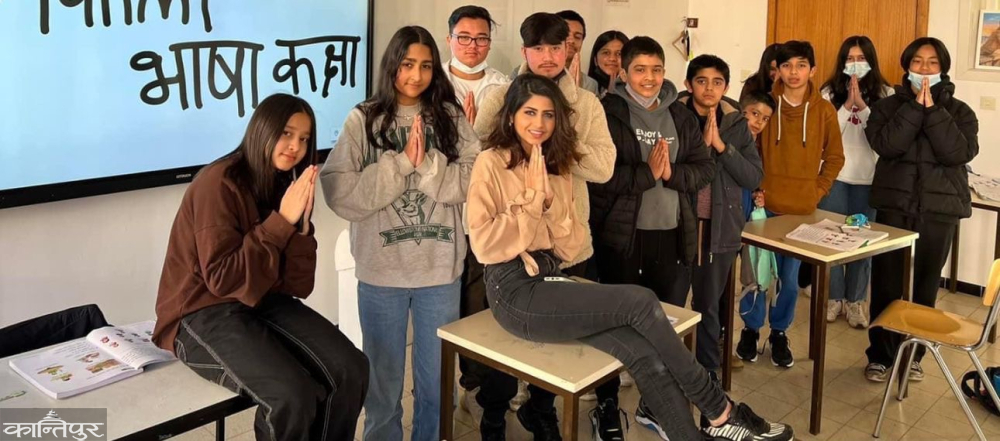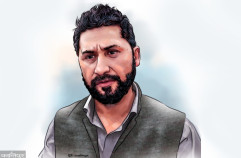Free Nepali language in Europe

We use Google Cloud Translation Services. Google requires we provide the following disclaimer relating to use of this service:
This service may contain translations powered by Google. Google disclaims all warranties related to the translations, expressed or implied, including any warranties of accuracy, reliability, and any implied warranties of merchantability, fitness for a particular purpose, and noninfringement.

Highlights
- Rubina Sharma from Myagdi, who came to Belgium a decade ago, has recently been promoting Nepali language and culture. After seeing the distance between children born in Belgium and their parents and relatives due to language, she started free Nepali language classes.



In recent times, the number of Nepalis who go abroad and settle there has increased rapidly. The problem faced by most of the first generation Nepalis who arrived in foreign land is the same. That is - not interfering with international (English) or the language of that country. However, most of the second generation Nepali who came abroad at a young age or were born abroad are unaware of their mother tongue.

The situation is the same in the European country Belgium. Born in Myagdi, Rubina Sharma grew up in Parbat Mamaghar. Then she reached Kathmandu and went to Belgium with her parents in 2012 at the age of 13. Rubina did not know much about the struggles and shortages of foreign lands. Because, his father Poshanath and mother Radha Kumari were in Belgium. They had already arrived in Belgium a decade before Rubina went.
After arriving in Belgium, Rubina enjoyed the new country and environment for some time. But after a little understanding and knowing, listening, one thing shocked him a lot. He was deeply saddened to see the Nepalis of the latest generation as if they were oblivious to their mother tongue, even though it was seen in their culture, costumes and lifestyle during festivals and festivals. This is the reason why Rubina has been working on the preservation and promotion of Nepali language and culture lately. She says that she enjoys being with children more than dating and outing.
After seeing the distance between children born in Belgium and their parents and relatives due to language, she planned to start a Nepali language class. At that time, he came in contact with Khadga Bahadur KC, former president of NRN Belgium. After Casey inspired Rubina to take up social work, Rubina joined the Sangrila Society in Belgium.
 She became a member of NRN Belgium three years ago and the general secretary about a year ago. She was elected unopposed in both positions. She became the youngest officer in the history of NRNA, which has branches in 86 countries. He was inspired to come to the NRN campaign by the then youth coordinator Kashi Danai and NRNA activist Deepak Neupane.
She became a member of NRN Belgium three years ago and the general secretary about a year ago. She was elected unopposed in both positions. She became the youngest officer in the history of NRNA, which has branches in 86 countries. He was inspired to come to the NRN campaign by the then youth coordinator Kashi Danai and NRNA activist Deepak Neupane.
After joining NRNA, Rubina came into limelight. Contact also increased. The people of the community started getting closer. She began to engage in full-time social work. She had announced the agenda of conducting language classes before coming to NRNA. But despite being the general secretary, his plan to start Nepali language classes aimed at children of Nepali origin in Belgium was meaningful.
Rubina now teaches free Nepali language classes in Leuven every Sunday morning from 10.30 am to 12.30 pm. Currently there are 30 tribal children in the class. The age of the children taking the class is from 6 to 18 years.
There were many children when the class started, but now there are fewer. "It took more than a year and a day to teach only ``a kha ga dha'' because he did not come to class regularly and there was no follow-up at home," she said. Because both children and parents understand the importance, I have planned to continue it until later.'
Rubina said that she is running a class by renting a classroom in a local school. Sometimes the local council helps but this is not constant so some parents also help pay the rent. She remembered that Reena Shahi, Parmanand Sapkota and Narayan Adhikari also played an active role in teaching Nepali. He suggested that Nepali government and NRN should jointly carry out this campaign as there is a risk of extinction of the Nepali language in foreign countries.
 Even before Sangrila Samaj Belgium and NRNA came to Belgium, she used to support other organizations. Even during the earthquake, she was very active in Nepal for relief distribution and support. Recently, she is very busy with work, studies and social work.
Even before Sangrila Samaj Belgium and NRNA came to Belgium, she used to support other organizations. Even during the earthquake, she was very active in Nepal for relief distribution and support. Recently, she is very busy with work, studies and social work.
"I have forgotten what free time is," she says, "Free time is spent in social service." Rubina said that when she goes home in the evening and remembers the work she has done throughout the day, she gets complacent. She is a student of bio technology and is an educational coordinator at Active Intercultural Federation, which has many foreign organizations as members. Rubina, who recently graduated from Interpen University, is all set to start her master's degree soon.
In the future, he is determined to become the president of NRNA Belgium and do something in the field of bio technology.
He says that he is working with the idea of strengthening the organization by making NRNA 'recognized' in the EU. Now our branch is registered in Leuven. We want to get service facilities from the state," she said. He is of the opinion that since they are working in different fields, only some cities have recognized them and only getting a grant as a socio-cultural department is not enough.
Rubina recently gave her first institutional presentation to a state government in Belgium about the establishment, structure, MIS system, online voting and objectives of the Non-Resident Nepali Association. In a program organized by the organization department of the Brussels-based Flemish State Council, she demanded for the Nepali language, culture and Nepali community to have necessary program halls and playgrounds. Rubina said that due to the many policies and laws of the federal government, the organization registration process has become complicated and should be made easy and simple.
'If the NRNA is strong and capable, we can help not only in Belgium, but also in other countries with low wages,' she said There are ten thousand Nepalis. There is no problem to survive because of social security. However, due to language problems, Rubina says that some people have problems in getting jobs from essential agencies like banks, hospitals, police and getting jobs according to their skills.
Nepalis who do business in Belgium are making progress. More than half of Nepalis are in the restaurant business. Rubina, who took Nepali citizenship at the age of 16, got her passport six months after arriving in Belgium. "If I want, now I have the facility to take non-resident Nepali citizenship, but I feel that Nepal treats me as a second-class citizen," she says.
 प्रकाशित : असार ७, २०८१ ०७:३८
प्रकाशित : असार ७, २०८१ ०७:३८

 २२.१२°C काठमाडौं
२२.१२°C काठमाडौं











